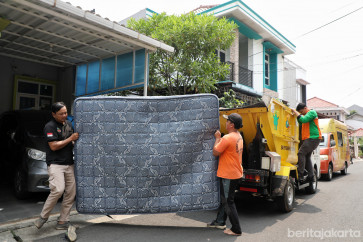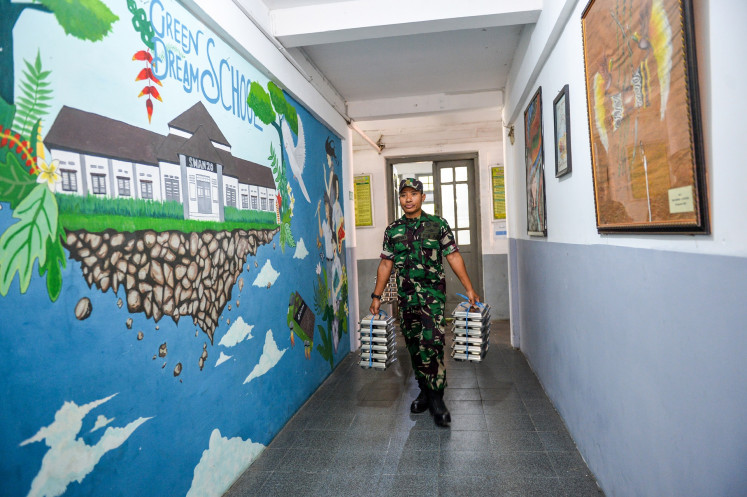Popular Reads
Top Results
Can't find what you're looking for?
View all search resultsPopular Reads
Top Results
Can't find what you're looking for?
View all search resultsRelocated families face another eviction
A neighborhood unit head at the Jatinegara Barat low-cost apartments, Lita Pandiari, said she has run out of ways to help residents who are unable to pay rent to stay longer
Change text size
Gift Premium Articles
to Anyone
A
neighborhood unit head at the Jatinegara Barat low-cost apartments, Lita Pandiari, said she has run out of ways to help residents who are unable to pay rent to stay longer.
“We have gone to the management as well as the subdistrict head. They told us they only follow the rules,” she said on Tuesday.
She said because of unsteady incomes, 12 households in her neighborhood unit had already received first and second warning letters as they had not paid rent for between six and eight months. “A total of 120 families in our apartment building have already received the warning letters,” he said.
One year after they were forcibly evicted from Kampung Pulo in East Jakarta, the fate of low-income residents who were relocated to the nearby Jatinegara Barat low-cost apartments (rusunawa) does not seem to have gotten any better.
Many residents who work as street vendors also suffered from income loss as the purchasing power of the tenants decreased, comparing to when they lived in Kampung Pulo. Each family must spend from Rp 500,000 to Rp 600,000 for rent, water and prepaid electricity every month.
The situation is getting worse as they have been threatened with eviction from their units because when they moved to the rusunawa they signed letters agreeing that they would leave their apartments if their rent was in arrears for three consecutive months.
Lita said instead of finding solutions to help those who could not pay rent, the management informed them that they would seal the units by cutting off electrical power and the water supply before asking them to move.
“Most of us work as laborers and motorcycle taxi drivers. It is hard for us to pay rent that can reach up to Rp 2.7 million [US$204],” she said, while sending one of the warning letters.
According to the Housing and Administration Building Agency’s data, the same fate has befallen many other residents who were relocated to various low-cost apartments around the city.
Sarkinah, a resident of the Cipinang Besar Selatan low-cost apartment building in East Jakarta, said she had not been able to pay rent or for electricity for the last three months because her business had been very quiet recently.
Having been evicted from the Cipinang riverbank last year, the woman said a lot of her belongings were destroyed during the forced relocation and now things had gotten worse as she owed more than Rp 600,000 in unpaid rent.
“My head hurts when I realize that it has been three months and I still have no money,’ Sukinah said
Living in Block C of the rusunawa, Sarkinah said some of her neighbors had red notices on their front doors because they had not paid their rent for more than six months.
As of August, in Daan Mogot, West Jakarta, 206 out of 640 families are in arrears with their rent for up to three months, the agency’s data says.
Agency head Arifin confirmed that some of the tenants have not paid the rent for months. “We have been sending them warning letters. We will evict them from the units if they still do not want to pay,” he said.
He added that the agency had planned to conduct such actions next week.
“Most of them have rent in arrears for six to eight months,” he said, adding that the number was small compared to the total 14,000 households who occupied these rusunawa.
Arifin said he had not calculated the total number of tenants who had not paid rent for months, but they mostly resided in East Jakarta’s Marunda and Jatinegara Barat and North Jakarta’s Kapuk Muara and Muara Baru. He, however, said he believed that they did not pay because they did not want to, not because of financial difficulties.
“We will try to help those who have extreme difficulties like having no job or being a single breadwinner for the whole family,” he said.
He added that the agency could cooperate with other institutions like the Jakarta Alms and Donation Agency (Bazis) to help them pay rent.










